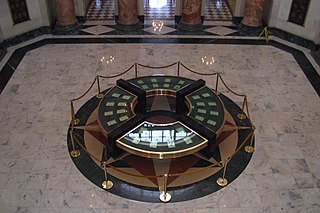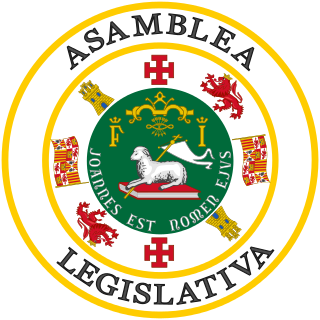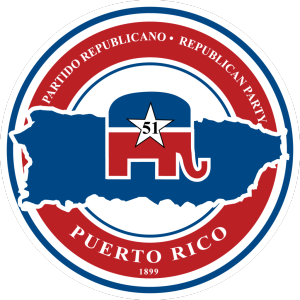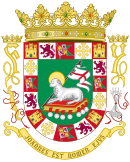
The politics of Puerto Rico take place in the framework of a democratic republic form of government that is under the jurisdiction and sovereignty of the United States Congress as an organized unincorporated territory. Since the 1898 invasion of Puerto Rico by the United States during the Spanish–American War, politics in Puerto Rico have been significantly shaped by its status as territory of the United States. The nature of Puerto Rico's political relationship with the United States is the subject of ongoing debate in Puerto Rico, in the United States, the United Nations and the international community, with all major political parties in the archipelago calling it a colonial relationship.

The government of the Commonwealth of Puerto Rico is a republican form of government with separation of powers, subject to the jurisdiction and sovereignty of the United States. Article I of the Constitution of Puerto Rico defines the government and its political power and authority. The powers of the government of Puerto Rico are all delegated by the United States Congress and lack full protection under the U.S. Constitution. Because of this, the head of state of Puerto Rico is the President of the United States.

Pedro Juan Rosselló González is a Puerto Rican physician and politician who served as the governor of Puerto Rico from 1993 to 2001. He was President of the New Progressive Party from 1991 to 1999 and 2003 to 2008, and served as Senator for the District of Arecibo from 2005 to 2008. His son, Ricardo, was also Governor of Puerto Rico from 2017 to 2019.

The Constitution of the Commonwealth of Puerto Rico is the controlling government document of Puerto Rico. It is composed of nine articles detailing the structure of the government as well as the function of several of its institutions. The document also contains an extensive and specific bill of rights. It was ratified by Puerto Rico's electorate in a referendum on March 3, 1952, and on July 25, 1952, Governor Luis Muñoz Marín proclaimed that the constitution was in effect. July 25 is known as Constitution Day.

General elections were held in Puerto Rico on Tuesday, November 2, 2004. After a count by the State Commission of Elections, the winner was inaugurated to a four-year term as Governor of Puerto Rico on January 2, 2005.

The Senate of Puerto Rico is the upper house of the Legislative Assembly of Puerto Rico, the territorial legislature of Puerto Rico. The Senate, together with the House of Representatives of Puerto Rico, control the legislative branch of the government of Puerto Rico.

The Legislative Assembly of Puerto Rico is the territorial legislature of the Commonwealth of Puerto Rico, responsible for the legislative branch of the government of Puerto Rico. The Assembly is a bicameral legislature consisting of an upper house, the Senate normally composed of 27 senators, and the lower house, the House of Representatives normally consisting of 51 representatives. Eleven members of each house are elected at-large rather than from a specific legislative district with all members being elected for a four-year term without term limits.

The Socialist Party, also known as Socialista Obrero, was a pro-statehood political party in Puerto Rico, that also contemplated independence in the case that entry into the American Union was denied by Congress. The party was concerned with improving the social welfare of Puerto Ricans.
Miguel Angel García Méndez was a Puerto Rican politician and businessman. García Méndez served as the 11th Speaker of the House of Representatives of Puerto Rico and later served in the Puerto Rico Senate. He helped found the Republican Statehood Party.

Jenniffer Aydin González Colón is a Puerto Rican politician who serves as the 20th Resident Commissioner of Puerto Rico. González has served in leadership positions in the New Progressive Party of Puerto Rico (PNP) and in the Republican Party of the United States. These positions included being the chairwoman of the Puerto Rico Republican Party, speaker and minority leader of the House of Representatives of Puerto Rico, and vice-chair of the PNP. González is the youngest person to be Resident Commissioner and the first woman to hold the role.

A referendum on how many chambers the Legislative Assembly should have was held in Puerto Rico on July 10, 2005. The proposed change to a unicameral legislature was supported by 83.94% of those voting, although voter turnout was just 22.58%. However, another referendum would have to be held to approve the specific amendments to the constitution that are required for the change. The House of Representatives subsequently let the bill die, so the changes were not realised. Had the changes been approved, the legislature would have become unicameral from 2009 onwards.

On June 8, 1950, the United States government approved Public Law 600, authorizing Puerto Rico to draft its own constitution in 1951. The Constitutional Assembly or Constitutional Convention of Puerto Rico met for a period of several months between 1951 and 1952 in which the document was written. The framers had to follow only two basic requirements established under Public Law 600. The first was the document must establish a republican form of government for the island. The second was the inclusion of a Bill of Rights.

Pedro Rafael Pierluisi Urrutia is a Puerto Rican politician and lawyer currently serving as governor of Puerto Rico since January 2, 2021. He has previously served as secretary of justice, resident commissioner, acting secretary of state, de facto governor of Puerto Rico and as private attorney for Puerto Rico's fiscal oversight board under the Puerto Rico Oversight, Management, and Economic Stability Act. He is a member of the New Progressive Party and the Democratic Party of the United States.
Voting rights of United States citizens who live in Puerto Rico, like the voting rights of residents of other United States territories, differ from those of United States citizens in each of the fifty states and the District of Columbia. Residents of Puerto Rico and other U.S. territories do not have voting representation in the United States Congress, and are not entitled to electoral votes for president. The United States Constitution grants congressional voting representation to U.S. states, which Puerto Rico and other U.S. territories are not, specifying that members of Congress shall be elected by direct popular vote and that the president and the vice president shall be elected by electors chosen by the states.

The Democratic Party of Puerto Rico is the local affiliate of the U.S. National Democratic Party in the Commonwealth of Puerto Rico. Party membership consists of supporters of both the current Commonwealth status and those who favor statehood for Puerto Rico.

The political party strength in Puerto Rico has been held by different political parties in the history of Puerto Rico. Today, that strength is primarily held by two parties, namely:

The Puerto Rico Democracy Act is a bill to provide for a federally sanctioned self-determination process for the people of Puerto Rico.

The Popular Democratic Party is a political party in Puerto Rico that advocates to continue as a Commonwealth of the United States with self-governance. The party was founded in 1938 by dissidents from the Puerto Rican Liberal Party and the Unionist Party and originally promoted policies on the center-left. In recent years, however, its leaders have described the party as centrist.
Law #1 of August 4, 1952 of the Commonwealth of Puerto Rico established a full state holiday on July 25 of every year, to be known as Puerto Rico Constitution Day. The holiday commemorates the day the Constitution of Puerto Rico, approved on July 3, 1952, was signed into law by Governor Luis Muñoz Marín the same year.

The Republican Party of Puerto Rico is the local affiliate of the national United States Republican Party in Puerto Rico. The affiliation started in 1903. The party does not participate in the November elections mandated by the Constitution of Puerto Rico for local registered political parties because it is not a registered party in Puerto Rico for local electoral purposes. Instead, the party holds its own elections to select the Puerto Rico delegates to the Republican National Convention and holds presidential primaries on the last Sunday of February.














